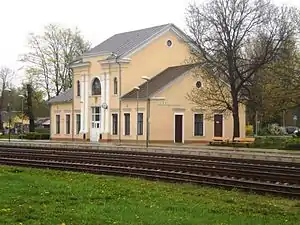Kėdainiai railway station
Kėdainiai railway station is a Lithuanian Railways station in Kėdainiai serving passenger trains.
Kėdainiai railway station Kėdainių geležinkelio stotis | |
|---|---|
 | |
| Location | S. Dariaus ir S. Girėno g. 5, Kėdainiai Lithuania |
| Coordinates | 55°16′14″N 24°01′01″E |
| Operated by | Lietuvos geležinkeliai |
| Line(s) | |
| Platforms | 2 |
| Tracks | 4 |
| Train operators | Lietuvos geležinkeliai |
| Connections | |
| Other information | |
| Website | www |
| History | |
| Opened | 1871 [1] |
| Key dates | |
| 1944 | Demolished |
| Passengers | |
| 2015 | 18,674 per year [2] |
History
The main hall of the station was built in 1871, soon after the first section of Libau–Romny Railway line was laid between Kaišiadorys and Liepāja. Regular trains started running on 11 September 1871.[3]
The newly built railway made a significant impact on city's trade development, as it gave access to Vilnius, Šiauliai, Riga, Liepāja, Moscow, as well as other cities in Belarus and Ukraine. It is known that a total of 38,035 kg of cucumbers were transported from the station in 1896. The following year 10 wagons left just to Liepāja.[4]
On 1 August 1944, the building was demolished by retreating Nazis.
References
- "Vykdant projektą "Praeitis bendrai ateičiai" praturtinti Kėdainiai". regionunaujienos.lt. 2017-06-19. Retrieved 2018-01-15.
- "Dėl Kėdainių miesto darnaus judumo plano tvirtinimo". Kedainiai District Municipality. December 2016. Retrieved 2018-01-15.
- Aušra LAURINKIENĖ, Aušra. "Kultūros paveldo svarba ir reikšmė Radviliškio rajone: Radviliškio lokomotyvų depo garsai". Radviliškio naujienos. Retrieved 2018-01-15.
- "Žydų bendruomenės Kėdainių krašte – tai, ko netekome…". Kėdainių mugė. 2016-09-25. Retrieved 2018-01-15.
This article is issued from Wikipedia. The text is licensed under Creative Commons - Attribution - Sharealike. Additional terms may apply for the media files.